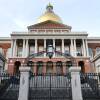Remember the 2000 presidential election? The 36-day long recount, the Supreme Court decision in favor of George W. Bush over Al Gore, and of course, the hanging chads? It was a mess, but also, a wake-up call, that resulted in Congress passing the 2002 Help America Vote Act. The federal government invested $3.4 billion so that states could replace their old voting machines with new ones. But technology has come a long way in 15 years, and a local startup says their machines are the future.
At the Clear Ballot offices in downtown Boston, chief operating officer Jordan Esten demonstrates how their voting machine works. With a filled-in ballot in hand, he slides the sheet into a digital scanner.
“Within three seconds it's now tabulated the ballot,” Esten says.
This may not look much different from how we cast our ballots now, but this machine is fast and it answers back.
“If you were to put a ballot in there, and you had marked two candidates in one contest, it would tell you,” Esten says. “It would give you a warning and kick that ballot back out so you could vote again. You could go back and get a new ballot to vote again.”
It takes a digital scan of your ballot but also keeps a paper record. Think of it as a PDF of your ballot, which is then stored securely in a library. Although Massachusetts is already a paper ballot state, Esten says this digital scan would come in handy if there’s a call for a recount or doubts about a voter’s intention because an oval is filled in funny.
“So they now have this library of every single result, and they can hone in on every single contest for voter intent," Esten says. "So they can know if you've circled the name. They can see that instantly and your vote will still count."
It could also save time at both the polls and in recounts by bringing up all the ballots in a dashboard instantaneously.
“In a matter of seconds you see every single vote anonymously," he added. "But the election officials can know and have confidence that this was correctly counted.”
And confidence is critical as we learn more about Russian hackers accessing the voting systems of as many as 39 states before the 2016 presidential election. Clear Ballot’s systems do not have any internet connection. But cybersecurity researcher, Ben Buchanan, of the Belfer Center for Science and International Affairs, says all digital voting systems have their vulnerabilities.
“Any election infrastructure should not be connected to the internet. But there are ways of reaching non-internet connected machines. For example, one method might be to target the election administrators’ people who actually make the ballot," says Buchanan. "And if you could find a way to get malicious code into those administrators’ computers, potentially those administrators unwittingly transfer that code when they load the ballot onto the machine.”
Beyond that, he says having a verified paper trail is tantamount to safeguarding the electoral process. There are still five states in the U.S. and a number of counties that don’t have a paper trail. Some of these jurisdictions are also using voting machines that haven’t been updated in 12 years, making them vulnerable to security risks.
It has been 15 years since the federal government passed sweeping legislation to update our country’s voting infrastructure. The White House has been quiet on this issue, instead focusing on what it says is fraudulent voting with Vice President Mike Pence leading an inquiry into the matter. But in June, Amy Klobuchar, a Democratic senator from Minnesota, proposed legislation that would incentivize states to streamline their voting registration practices by rewarding them with grants to buy new voting technology. In the meantime, Buchanan says there are a couple things states can do to ensure their elections are secure.
“The first is, we need to do security audits of election software [and] election infrastructure to make sure there are not vulnerabilities that hackers can exploit," he says. "And what would that entail ... getting cryptographers and cyber security experts to look at the code and look at the algorithms to make sure that they are secure."
In Massachusetts, election officials inspect all the state’s tabulators at least once before each election, and they do a random hand-counted sample audit after the voting. These don’t involve cryptographers, though, because Massachusetts paper ballot system is low-tech. And, that is a good thing for the Commonwealth. But as other states scramble to secure their voting systems, the problem is long from being solved for the nation.



